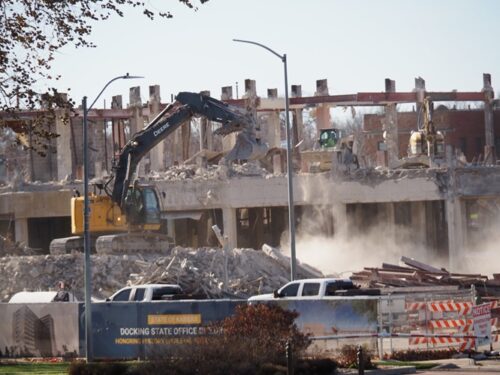2.2.24 Kansas Reflector -TOPEKA

Advocates consider bill a ‘delicate balance’ of business, employee interests
Four business attorneys and four labor lawyers presented the Kansas Legislature a compromise package of changes to the workers’ compensation system that would curb unwarranted claims and administrative costs while raising the cap on financial awards to injured workers and index the maximum payout to inflation.
Kansas special interest groups taking part in months of negotiations urged the 2024 Legislature to resist the temptation to amend the plan because modifications could unravel the deal reached among organizations prone to ideological conflict. The House and Senate commerce committees met jointly Thursday to get a sense of what framers of Senate Bill 430 believe could be accomplished with the overhaul.
“We believe the bill makes the workers’ compensation system more fair and better for all parties in the state of Kansas and we encourage you to support the bill in its current form without additional amendments,” said Jeff Cooper, who represented the Kansas Trial Lawyers Association in negotiations.
Cooper, who specializes in providing legal counsel to injured workers, said the bill was a “delicate balance” of concerns expressed by the business and worker factions taking part in arduous negotiations.
He said death benefits under the bill would rise from $300,000 to $500,000 and total disability benefits would move from $155,000 to $400,000. In addition, a cost-of-living mechanism would be be initiated in July 2027 to regularly raise cap amounts.
Workers’ compensation in Kansas operates as a no-fault system with legal protections for employers and employees established by the state.
Alan Cobb, president and CEO of the Kansas Chamber, said negotiations conducted in 2023 resembled a comparable reform effort that took place in 2011. The new bill would guarantee injured workers were compensated for legitimate claims and injuries never intended to be covered by the workers’ compensation would not, Cobb said.
“Compromise can be difficult to reach,” Cobb said. “But when opposing sides take the time to listen to one another, agreement can be found that serves all involved parties well.”
Under the Senate bill, adjustments would be made to when notices of injury were required and how medical records were admitted into evidence. Court-ordered independent health evaluations of injured workers could be limited to reduce costs and delays in moving ahead with claims.
The bill would modify the offset allowed for Social Security retirement benefits and would alter wage calculations for injured workers.
Worker interests during negotiations were represented by the American Federation of Labor and Congress of Industrial Organizations or AFL-CIO, the International Brotherhood of Teamsters and the Kansas Trial Lawyers Association.
In addition to the Kansas Chamber, negotiators serving business interests included the Kansas Society for Human Resources Management, the Kansas Self-Insurers Association and the National Federation of Independent Businesses or NFIB.
NFIB state director Dan Murray said the legislation would “protect small business owners from potentially nuclear court decisions that could upend our current system. Maintaining the integrity of our workers’ compensation system is critical to our state’s economic competitiveness.”
Tim Carpenter has reported on Kansas for 35 years. He covered the Capitol for 16 years at the Topeka Capital-Journal and previously worked for the Lawrence Journal-World and United Press International.
